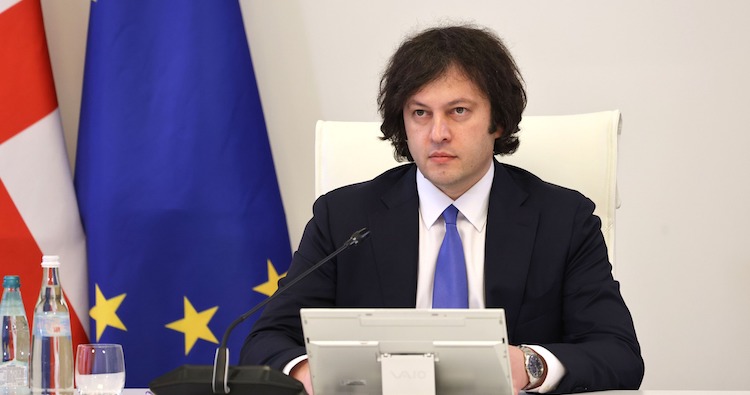Georgian PM: Venice Commission’s assessment on transparency law has “many absurd entries, lies”

Kobakhidze also told the interview the developments “explain why the discussion was closed at the last moment” by President Salome Zourabichvili’s veto on the law, which he alleged she had been “made” to exercise by the domestic opposition. Photo: Government Administration
Georgian Prime Minister Irakli Kobakhidze on Wednesday told the country’s Public Broadcaster the opinion published on Tuesday by the Venice Commission of the Council of Europe in its assessment of the Georgian law on transparency of foreign influence contained “many absurd entries and lies”.
The Commission “strongly recommended” the Georgian Government to repeal the legislative piece in its current form, saying its “fundamental flaws” would involve “significant negative consequences” for the freedoms of association and expression, the right to privacy, the right to participate in public affairs, as well as the prohibition of discrimination.
The law requires registration of non-commercial legal entities and media outlets in the country as “pursuing the interests of a foreign power” if they derive more than 20 percent of their funding from abroad.
In his response, Kobakhidze said he “felt uncomfortable as a lawyer” when reading the opinion “because of the Venice Commission's weakness it has shown with this document”.
There are a lot of lies in the document, and with these lies there is a completely absurd legal reasoning without any argumentation - but the public sees, in the end, not what the Venice Commission has said, but where the truth lies, and this is one of the serious achievements, which we have for these two or three years”, he claimed.
That is why we often say today our country is as sovereign as ever. This means, the public appreciates the independence of our country more among other things. So the price of independence is more understood by Georgian society today than it was even three or four years ago”, he added.
The Government head alleged “processes” over the last two months had “left no room for discussions on the draft law at all”, in reference to public protests against the law and criticism from some of the Government’s foreign partners, and said the Government had “consistently offered” the youth participating in public protests against the domestic law and ambassadors in Georgia “public discussions” on the law.
In fact, there was a clear political interest in not making the activities of non-governmental organisations transparent. We all understand that NGOs are generally a political tool. NGOs are a political tool that is used in different countries for realisation of political interests and goals - therefore, where we are dealing with politics. Nobody is ever happy about the transparency of their own finances”, the PM claimed.
Therefore, the subjective interest is understandable, but in the end, when transparency is demanded from you, you cannot fight against transparency in such a rude way, it is incomprehensible and unacceptable”, he added.
Kobakhidze also told the interview the developments “explain why the discussion was closed at the last moment” by President Salome Zourabichvili’s veto on the law, which he alleged she had been “made” to exercise by the domestic opposition.
The legislative piece was supported by 84 MPs in the 150-member lawmaking body last week, against the backdrop of ongoing public protests and criticism from Georgia’s foreign partner states, with 30 voting against.
It requires groups “considered to be an organisation pursuing the interests of a foreign power” to be registered in the public registry with the status and publicise their received funding.
Zourabichvili vetoed the law, but the ruling party has enough votes in the Parliament to override the veto.
 Tweet
Tweet  Share
Share